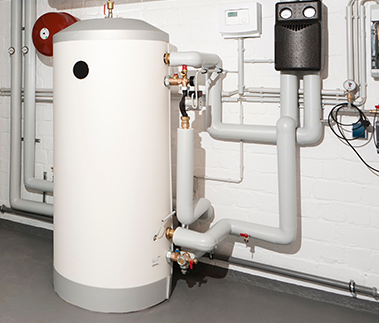Benefits
- Achieve up to 95% energy efficiency with your water heating, surpassing environmental performance of traditional gas water heaters
- Take advantage of rebates for qualifying equipment to enhance both energy savings and overall comfort, affordably
Enjoy even greater efficiency and cost savings compared to conventional gas storage water heaters
While gas condensing water heaters offer efficiency, heat pump water heaters provide even greater environmental advantages, making them a superior choice for sustainable energy solutions.
Incentives & Financing
Single-Family
INCENTIVES
A $300 Instant Discount for ENERGY STAR certified gas condensing storage water heaters with a thermal efficiency of 94% or greater
Federal tax credits may be available. Learn more about the IRA tax credits here or speak to your tax preparer
FINANCING
Multifamily
INCENTIVES
Market Rate: Up to 50% of measure cost
Income Eligible: Up to 75% measure cost
FINANCING
Multifamily Clean Energy Financing
Information & Tips
ENERGY STAR certified gas condensing water heaters use similar technology as gas storage water heaters, but they condense water vapor in exhaust gasses and recover heat that would normally be lost as the exhaust is vented outside your house. By holding onto this heat, they can achieve an efficiency of 90 percent or higher. (Source: ENERGY STAR)
High-efficiency gas condensing storage water heaters employ the same technology as standard gas storage water heaters: a glass-lined steel tank is heated by a burner located at the bottom of the tank. But a few basic changes make them operate more efficiently. Efficient models simply have better insulation, heat traps, and more efficient burners – improvements that have a modest impact on price lead to 8% less energy use.
Some very high efficiency models use a secondary heat exchanger that extracts more heat from the combustion gas, cooling it to the point where there is condensation – hence these types of heaters are called “gas condensing.” These gas condensing water heaters, like gas condensing furnaces, require venting through a vertical PVC pipe and a condensate drain.
With help from approved contractors that support Energize ConnecticutSM energy efficiecy programs, you can install high-performance gas condensing water heating equipment without paying a premium price.
Pre-approval and a post-inspection from the participating utility are required if the rebate total exceeds $7,500.
Natural gas condensing water heaters require venting to expel the fumes created by their combustion processes, like other kinds of gas water heaters. With this type of model, you can vent fumes through a vertical PVC pipe and condensate drain. (Source: ENERGY STAR)
High-efficiency condensing gas tank water heaters are designed with a helical internal heat exchanger rather than a straight pipe. This design reduces wasted heat and allows for more heat to be transferred into the water, which decreases energy use by 29% or more compared to a standard gas tank water heater. (Source: ENERGY STAR)
The amount of hot water a natural gas water heater can deliver is determined by two things: its capacity (in gallons) and its first-hour rating. If your current water heater meets your needs, you can probably replace it with one the same size. But also look at its first-hour rating, which measures how much hot water it can deliver during a busy hour. The better the first-hour performance the more likely you can get efficient performance without buying a larger water heater. (Source: ENERGY STAR)
Did you know that there are federal tax credits available for high-efficiency electric water heating systems?
Tip: Explore clean heating and cooling alternatives like heat pump water heaters, offering exceptional energy efficiency and environmental benefits. Learn more about how these systems can enhance your comfort and sustainability in your home or business.
Alert:
In line with the Department of Energy and Environmental Protection (DEEP) Final Determination of the 2022 – 2024 Plan, the Sponsors of Energize ConnecticutSM are discontinuing rebates and incentives for natural gas equipment as of December 31, 2024. Customers currently working with contractors to replace their natural gas equipment have until December 31, 2024 to complete the installation of measures to be eligible for applicable rebates. All natural gas equipment sales must take place on or before December 31, 2024 to be eligible for point of sale (midstream) incentives.
Also Explore ➞
Heat Pump Water Heaters
Heat pump water heaters are a clean, efficient alternative, using 70 percent less electricity than a standard electric water heater, which can lower your energy use. With a heat pump water heater, you get reliable hot water when you need it for less.






